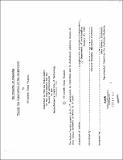The transfer of knowledge through the organization of the neighborhood
Author(s)
Chapman, Elizabeth Alexa
DownloadFull printable version (5.284Mb)
Other Contributors
Massachusetts Institute of Technology. Dept. of Architecture.
Advisor
Chester Sprague.
Terms of use
Metadata
Show full item recordAbstract
In the traditional small community, people learned how to maintain their own homes by watching activities in which the elements of their physical environment were made. This work was done out in the open, where everyone could see it as they walked by. People grew up knowing how to take 'responsibility' for the maintenance and modification of their own home. During and after the Renaissance , when these small independent communities merged with other communities, and a specialized economy developed, the integration of functions which supported learning from the environment began to disappear. This is a study of a neighborhood in Rome, where the traditional characteristics which support the transfer of knowledge, still exist . The streets are arranged in a hierarchy from most public to most private. When work places, or retail shops, or residences, occur on a public street, they are large. When they occur on a private street, they are small. 'A hierarchy of building typologies corresponds to the hierarchy of activity sizes. The buildings which are large and located in the public zone, where people are moving quickly, have large openings. The buildings which are small and are located in private zones, where people spend time in the street, have smaller openings. The result is that the building facade exposes the appropriate amount of the work process to the residents, as they use the neighborhood. With this combination of hierarchies, Trastevere supports the transfer of knowledge, from the activities to the residents of the neighborhood.
Description
Thesis (M.Arch.)--Massachusetts Institute of Technology, Dept. of Architecture, 1981. MICROFICHE COPY AVAILABLE IN ARCHIVES AND ROTCH. Bibliography: p. 52.
Date issued
1981Department
Massachusetts Institute of Technology. Department of ArchitecturePublisher
Massachusetts Institute of Technology
Keywords
Architecture.